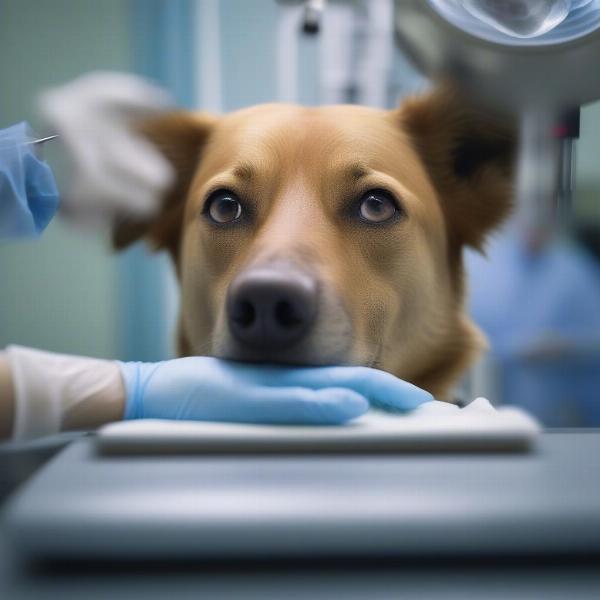Eye enucleation in dogs, the surgical removal of the eye, can be a distressing topic for pet owners. This article aims to provide a comprehensive understanding of this procedure, covering the reasons behind it, what to expect during and after surgery, and how to best care for your dog through recovery.
What is Eye Enucleation in Dogs?
Eye enucleation is the complete removal of the eyeball, including the eyelids and surrounding tissues. While it sounds drastic, it’s often a necessary procedure to alleviate pain and prevent further complications caused by various eye conditions.  Chó đang được phẫu thuật cắt bỏ nhãn cầu
Chó đang được phẫu thuật cắt bỏ nhãn cầu
“Enucleation provides a humane solution when an eye is causing significant pain or poses a threat to the dog’s overall health,” says Dr. Emily Carter, DVM, a veterinary ophthalmologist with over 15 years of experience. “While it can be emotionally challenging for owners, it often significantly improves the dog’s quality of life.”
Why Might a Dog Need Eye Enucleation?
Several conditions can necessitate eye enucleation. These include severe eye trauma, glaucoma unresponsive to medication, intraocular tumors, and painful or infected eyes that are beyond repair. In such cases, removing the eye becomes the best course of action to relieve suffering and prevent further health issues.
When is Enucleation Recommended?
- Severe Trauma: If the eye is severely damaged beyond repair, enucleation can prevent infection and pain.
- Glaucoma: When glaucoma is unresponsive to medical treatment and causes significant pain, enucleation can provide relief.
- Intraocular Tumors: Tumors within the eye can often be treated effectively with enucleation.
- Severe Infection: Untreatable eye infections can spread and impact a dog’s overall health, making enucleation necessary.
What to Expect During and After Eye Enucleation Surgery
Eye enucleation is performed under general anesthesia. The veterinarian removes the entire eye, including the eyelids and associated tissues. The surgical site is then closed, and the area is often bandaged. dog prosthetic eye
Following surgery, pain medication and antibiotics are typically prescribed. Your dog may experience some swelling and discomfort, which should subside within a few days to weeks. Regular veterinary check-ups are necessary to monitor healing and address any potential complications. eye removal surgery dog
“Post-operative care is crucial for a smooth recovery,” adds Dr. Michael Davies, DVM, a board-certified veterinary surgeon. “Owners should carefully follow their veterinarian’s instructions regarding medication, wound care, and activity restriction.”
Caring for Your Dog After Eye Enucleation
Caring for a dog after eye enucleation involves managing pain, preventing infection, and adapting to their new vision. You’ll need to administer medication as prescribed, keep the surgical site clean and dry, and prevent your dog from rubbing or scratching the area.
It’s important to understand that dogs adapt remarkably well to life with one eye. Their other senses compensate, and they can still lead full and active lives.
Conclusion
Eye enucleation in dogs, though a significant procedure, can greatly improve their quality of life in cases of severe eye disease or trauma. By understanding the reasons for the surgery, the procedure itself, and post-operative care, you can be best prepared to support your dog through this process. retrobulbar abscess in dogs
FAQ
- Is eye enucleation painful for dogs? The surgery is performed under general anesthesia, so the dog feels no pain during the procedure. Post-operative pain is managed with medication.
- How long does it take for a dog to recover from eye enucleation? Most dogs recover within a few weeks, though complete healing may take longer.
- Can a dog live a normal life with one eye? Yes, dogs adapt incredibly well to vision with one eye.
- What are the signs of complications after eye enucleation? Excessive swelling, redness, discharge, or pain should be reported to your veterinarian immediately.
- Are there alternatives to eye enucleation? Depending on the underlying condition, there may be alternative treatments. Your veterinarian will discuss the best options for your dog’s specific situation.
- How much does eye enucleation surgery cost? The cost varies depending on the location and complexity of the case.
- Will my dog need a prosthetic eye? A prosthetic eye is primarily for cosmetic purposes and isn’t medically necessary.
About ILM Dog
ILM Dog is your premier online resource for expert advice on all aspects of dog care, from breed selection and puppy care to senior dog health and training. We offer practical guidance and in-depth information on dog breeds, health and medical care, training and behaviour, nutrition, grooming, exercise, travel, and products. For more information, contact us at [email protected] or +44 20-3965-8624. Visit ILM Dog for comprehensive dog care resources.